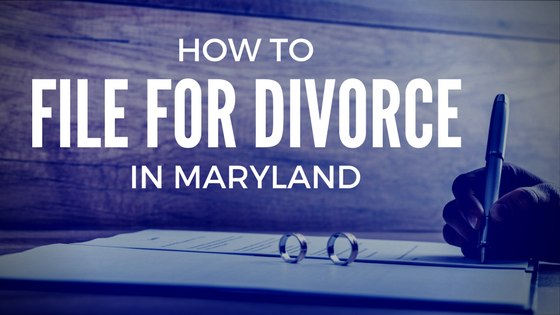How to File for Divorce in Maryland: A Step-by-Step Guide (UPDATED: July 2018)

How to File for Divorce in Maryland: 4 Steps
If you are facing divorce, you are undoubtedly under a great deal of stress. For most people, the uncertainty and confusion of divorce can be overwhelming. As a divorce attorney in Columbia, Maryland for over 30 years, I understand the effects that the chaos of divorce has on people. The goal of this article is to both provide clarification about how to file for divorce in Maryland, and outline the steps that you need to take to make sure that you and your family are protected.
Step #1: Plan for the “Rough Road”
You don’t need a divorce attorney to tell you that the road ahead is not an easy one. By nature, divorce is an emotionally charged, and often confrontational, process. It’s rarely pleasant.
Before we jump into the logistical elements of how to file for divorce in Maryland, you should be as certain as possible that divorce is the “right thing, now” for you and your family, before taking action. Take the time that you need to consider this very important decision, and evaluate whether you are emotionally ready to travel down this road. Marriage counseling, temporary separations and other alternatives can be pursued, with proper legal protections for each spouse, while you determine if divorce is “right” for you. Giving yourself (and your spouse) this time to evaluate your situation can often prevent regret later.
Step #2: Seek counsel from an experienced divorce attorney ASAP
When you are confident that divorce is the answer for your family, the logical next step is to start gathering all the information you can about how to file for divorce in Maryland. If you are reading this, you’ve obviously already taken that first step. However, while the internet can be a great resource, you should immediately seek professional advice from an experienced divorce lawyer.
Many people delay meeting with an attorney, usually in the hope of minimizing the expense of legal fees. Unfortunately, this decision can cost you more in the long run, as decisions made in the early stages of the divorce process can have a major impact on the ultimate outcome.
Just as you need to take time to make sure that divorce is the right move for you, you need to make sure that you hire the right divorce attorney. Instead of spending your time Googling how to file for divorce in Maryland, you should re-focus that energy on finding the attorney that is going to be your guide and advocate for you throughout this difficult process.
Consider this process to be a lot like dating: this relationship will have a significant impact on your future, so make sure that the lawyer you select is the proper fit for you. You don’t want to end up “divorced” from your attorney before your spouse!
It may be necessary to schedule initial consultations with multiple divorce attorneys before finding one that you “click” with. The purpose of the initial consultation is to get to know the attorney that may potentially be handling your case, and determine if he or she is the right fit for you. On the flip side, the initial meeting helps the divorce lawyer to gain a better understanding of your case, and evaluate whether he or she is the proper resource for addressing the matter at hand. The initial consultation is also an excellent opportunity to discuss fees, timing, potential conflicts, and other practical matters that may apply. To schedule an initial consultation with Coover Law Firm, please call us at (410) 995-1100 or click here.
4 Factors to Consider When Hiring a Divorce Lawyer
When “interviewing” potential divorce lawyers, it is important to weigh the pros and cons of working with each of them. Below are four areas that you want to focus on during this evaluation:
1. Family Law Experience
Attorneys are like doctors, in that most have areas of expertise. You wouldn’t go to a podiatrist to get a prescription for eyeglasses, right? In the same sense, you want an attorney that actively practices Family law and has considerable experience in handling divorce cases. You should know what percentage of his or her law practice is devoted to family law. Has the attorney handled cases similar to yours? Were they successful? How long has the attorney been in practice?
Ask questions about their experience. Understand that most attorneys do not handle the day-to-day issues relating to your case. Ask your attorney about all the potential staff members who may be assigned to your case. Ask about their individual experiences, and ask to meet them, if possible. Also, find out if your attorney has access to outside resources that may be relevant to your case. Does your attorney have a relationship with a forensic accountant? Would you need to hire a private investigator? a business appraiser? a vocational expert.
2. Experience with the Local Court System
This one is very important and often overlooked. Judges have significant discretion when deciding your divorce case. This means that for each of the 24 Family Courts in Maryland, each judge has his or her own unique way of deciding important issues like alimony, child support, custody and visitation. So, a divorce case in Howard County may not be handled exactly the same way or have the same outcome as a similar divorce case in Carroll County. You want an attorney who knows the judges and Family law magistrates and understands the nuances specific to your local court system.
If you live in Columbia, Ellicott City, Clarksville or other surrounding area in Howard County, MD, click here for general information about the Circuit Court for Howard County. The Howard County Courthouse is located at 8360 Court Avenue, Ellicott City, Maryland 21043 (click here for directions).
3. Compatibility with Your Specific Needs & Goals
It is important to keep in mind that the purpose of a divorce is to dissolve the marriage, and that on average, over 90% of divorce cases settle before trial. Many people, including some lawyers, lose focus and direction in the emotional divorce process. How does one handle the situation when the other spouse is focused on retaliation, or is trying to humiliate you, or attack you financially with excessive litigation? It’s important to find the best attorney for you that understands what to do in situations like these, and can effectively guide you through this stage in your life.
Attorneys are people too, and they all operate differently. You need to trust and be comfortable with your attorney. Is age, gender, personality, dress, etc. important to you? Are you looking for an aggressive pit bull who avoids resolution and favors litigation, or would you rather have a strong, experienced attorney who is focused on achieving your goals as quickly as possible from the start?
It’s ok to ask yourself and your potential attorney these questions. Many times, I have seen clients who have gone through two or three attorneys trying to find the “right” one. You should understand what type of divorce you want and the tone you desire to set during the course of the proceeding. This will help you make the right decision when choosing the best divorce attorney.
 4. Cost-Benefit Analysis
4. Cost-Benefit Analysis
Although it’s certainly understandable to want to spend as little as possible on legal fees, you do not want to end up with a costly (and possibly irreversible) legal mistake in an attempt to pinch pennies.
An attorney’s rate is usually determined by the amount of training he or she has had, how knowledgeable he or she is, and how much time, experience & success the attorney has had in representing clients in that specific area of law. Although you will most likely pay a higher hourly rate to work with a more experienced attorney, that fact does not necessarily mean that your divorce will end up costing more overall.
CONSIDER THIS: Typically, it will take an experienced attorney less time to complete the work than it would an inexperienced attorney, because he or she doesn’t need to spend as much time researching and has fine-tuned his or her processes. Many times, this results in a case with fewer billable hours and, ultimately, a lower overall cost.
Step #3: Determine what type of divorce is right for you
When filing for divorce in Maryland, there are several options available – each with its own requirements. Understanding the differences between the various “types” or “grounds” for divorce in Maryland is very important. Having this knowledge, and making an informed decision on the direction you want to take prior to filing for divorce, can save you a lot of time, money and stress down the road. An experienced divorce attorney can help guide you in evaluating which option is best for you and your family based on your unique situation.
Absolute vs. Limited Divorce
Maryland has two types of divorce – absolute and limited.
- Limited divorce is designed for separating couples who may not meet the requirements for absolute divorce, or for those whom an absolute divorce is not a viable option. If a couple is married but wants to live apart, with financial and custodial issues formalized through a court-approved Agreement, limited divorce may be the answer. Limited divorce is much less common than absolute divorce.
- Absolute divorce is what most people consider a “real” divorce, in that it dissolves the marriage entirely. The grounds for an absolute divorce can be fault-based and are covered in more depth below. To be granted an absolute divorce, at least one legally accepted reason or “ground” for divorce must exist.
GROUNDS FOR A NO-FAULT ABSOLUTE DIVORCE IN MARYLAND
- 12-Month Separation: Currently, physical separation is the most common grounds for divorce in Maryland. Parties must live apart and maintain separate residences for at least 12 months prior to filing for divorce. If the couple spends even one night together during the 12 month period, the “separation clock” may have to be reset.
- Mutual Consent: In October 2015, Maryland updated its laws to include a new option for divorce: “Mutual Consent”. A divorce by mutual consent has no “waiting period” or separation requirement, encourages couples to work out the terms of their divorce by written Agreement, and rewards them with a prompt – and relatively inexpensive – absolute divorce. ***UPDATE: When the law was initially rolled out in 2015, it was limited to only couples without minor children in common. However, this is now changing. Beginning October 1, 2018, married couples with minor children will also be able to forgo the one-year separation period and obtain a divorce on mutual consent grounds in Maryland.
Currently, both parties must personally appear before the court at the hearing for absolute divorce based upon “Mutual Consent”, but the testimony of a “corroborating” witness is no longer required.
In order to obtain a divorce by mutual consent in Maryland, married couples must do three things:
1. The couple reaches and signs a binding Agreement resolving alimony and division of property. Effective October 1, 2018, if the couple shares minor children, the Agreement must not only resolve all financial issues between the parties, but also resolve custody, access, and support of the minor children.
2. Both agree, and do, appear in court for the absolute divorce; and
3. Neither party files an opposition to the Agreement before the divorce hearing.
While pursuing a divorce by mutual consent can certainly save time and money, its not available to many and requires all the “work” to be done in the form of a written Agreement before filing.
It is important to bear in mind that while the ultimate written Agreement may be straightforward, your personal situation likely not simple . A form divorce Agreement is still a contract and just like any other contract, is binding when signed.
The availability of a quick and easy divorce should not cloud your judgment about the many issues that must be considered and reflected in the final Agreement. You should consult with an experienced divorce lawyer to review or prepare the Agreement before you sign the same. For more information about divorce by mutual consent, check out this blog about “Do It Yourself Divorce”
GROUNDS FOR A FAULT-BASED ABSOLUTE DIVORCE IN MARYLAND
As discussed above, an absolute divorce may also be granted on the fault-based grounds of:
- Adultery
- Desertion
- Cruelty
- Excessively vicious conduct; and
- Certain criminal convictions.
Unlike a no-fault divorce, certain fault grounds, if proven, don’t require a waiting period and may allow you to obtain a divorce immediately. A fault-based ground can be, but is not always, one of several factors that a Judge may weigh when evaluating the right to alimony or the issuance of a “monetary award “ or judgment to the “innocent” spouse. In certain rare circumstances, if the fault-based ground is proven, it may have an impact on child custody.
Step #4: Start Planning Your Post-Divorce Future
Hopefully, by now, you have a better understanding of the divorce process in Maryland. At this point, it is important that you start planning what your life will look like post-divorce. Your divorce attorney will give you more comprehensive information and issues to consider, but below are a few areas to explore as you begin your preparations:
 Child Custody:
Child Custody:
When children are involved in a divorce, child custody is typically the most intense and emotionally-charged issue in the entire process. If you have minor children together, what type of child custody arrangement will you seek? Where will the child have the most stable, supportive environment, factoring in lifestyles, schools, proximity to relatives/friends, work schedules, etc.? Do you and your spouse seem to be relatively on the same page regarding custody, or do you anticipate a custody battle?
 Property Division:
Property Division:
Create an inventory of the marital property that you own as a couple. How will you divide your assets? Will you sell the family home, or will one spouse keep it? Obviously, it’s rare for a divorcing couple to agree 100% on these issues. While future negotiations likely will occur, it’s beneficial to start working out a desirable, yet realistic, “best case scenario” in your mind as soon as possible.
Financial Planning:
Do you have a clear picture of what your financial situation will look like after divorce? Do you plan to pursue, or expect to pay, child support? What about alimony? To start preparing yourself, check out the resources below.
FINANCIAL PLANNING RESOURCES for more info on How to File for Divorce in Maryland
- Estimate Child Support Payments: Estimate monthly child
support payments by utilizing the Maryland Child Support Guidelines online calculator.
- Prepare Financial Statements: Start gathering the financial documentation that you are likely to need for any divorce settlement. Utilize the General Financial Statement on MDCourts.gov as a worksheet for gathering the information.
- Understand How Alimony is Calculated: If you think that you may be entitled to receive – or required to pay – alimony as a result of your divorce, you should make sure that you have an understanding of the factors that a judge will evaluate in determining an alimony award. For more information, check out this blog on the topic: https://www.cooverlaw.com/alimony-in-maryland/
Hopefully, this article has helped give you an overview of how to file for divorce in Maryland. However, it is important to understand that every family law and divorce case is unique, making it impossible to answer, in general terms, all of the questions regarding your specific matter that are most likely keeping you up at night. If you’ve made the determination that divorce is the best decision for your family, call Coover Law Firm today at (410) 995-1100 and schedule an initial consultation with Howard County divorce lawyer Fred L. Coover, Esquire. Our offices are conveniently located across from the Columbia Town Center in Columbia, MD. We look forward to serving you.
Disclaimer: The information in this blog post is provided for general educational & informational purposes only. It is not intended to convey legal advice or serve as a substitute for legal counsel on any subject matter.
Contact Us
Get Help Today From an Experienced Maryland Lawyer













